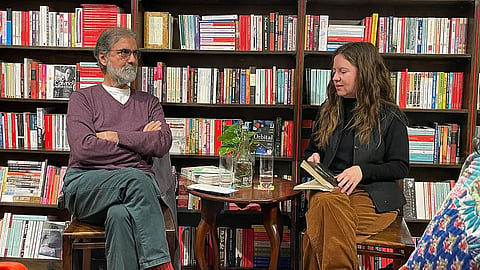
- LIFESTYLE
- FASHION
- FOOD
- ENTERTAINMENT
- EVENTS
- CULTURE
- VIDEOS
- WEB STORIES
- GALLERIES
- GADGETS
- CAR & BIKE
- SOCIETY
- TRAVEL
- NORTH EAST
- INDULGE CONNECT

Over a course of almost two years, from October 2010 to July 2012, Australian artist-writer Alana Hunt arranged 118 conversations over nun chai with her friends, family and strangers in Australia, India and Kashmir. The conversations ranged from thoughts on freedom, surveillance, curfews, loss, love, longing, home, motherhood… interspersed with newspaper clippings of Kashmiri dailies, exquisitely designed pink stains of nun chai on the pages of the “artwork”—as Hunt prefers to call the Cups of nun chai, the book published by Yaarbal Books—and images of people’s hands holding their cups or like in prayer.
Each of these free-flowing conversations was later recorded by Hunt from her own memory on her blog at first. She did not take any notes or audio recordings, what she brought to these conversations instead were the attentiveness of a listener and the empathy of an artist. The book originated from these conversations—an “archive of small moments, remembered within a terrain shaped by the persistent violence of colonisation and nation-making,” she writes in its introduction. On reading these conversations, the book also emerges as a testament to the power embedded in art to inform, carry and transmit the meaning of being human. And as a corollary, what is inhuman—violence, curfew, dehumanisation.
Over eight years in the making, Cups of nun chai was first published in the form of a flexibound book during the pandemic. Talking to a group of readers gathered in a Delhi bookshop recently—with Arundhati Roy in attendance—publisher-editor, esteemed filmmaker and writer Sanjay Kak said that the first print run was limited. The book has been received well by readers, and is now about to exhaust its second print run.
Bridging a gap
In 2010, 118 civilians were killed in the protests that raged in the valley after 17-year-old Tufail Ahmad Mattoo was fatally hit by a tear-gas canister as he made his way back home from tuition. Hunt, then in Australia, followed the events in the valley on social media—“[The project] emerged from the frustration of me sitting in Sydney and being in touch with friends in Kashmir on social media, seeing their daily updates… And then popping out and living with the people around me in Australia to realise that they had zero awareness about what was happening in Kashmir… So the work emerged from that gap, as a desire to sort of bridge that gap, even if it was just through a conversation with one individual.”
This powerful book is more relevant than ever now. All is well in Kashmir, it is suggested, in the aftermath of a "masterstroke"—abrogation of Article 370. Hunt's project is a timeless witness to and reminder of the conversations about Kashmir that have been erased in the transition.
Healing as an act of communion
Talking about the project, Kak says: “As a book, Cups of nun chai represents an extraordinary act of empathy. Alana’s writing is sensitive—and deeply ethical—as it wrestles with that old question that seems to paralyse most people: how should we respond to injustice?” Kak also says Hunt would mull over her words for hours and days at times, to carry the weight of these conversations without trivialising them. In many ways, then, her project is an exercise in communion and care. A blazingly original attempt to document the power of community in healing. This is achieved repeatedly in the stories themselves, but more arrestingly in the pictures of hands. And at other times photographed from above to show the lines on those hands—not only of destiny and fate, but also the lines etched by age and wisdom, and loss and grief.
As the conversations in the book circumscribe various issues, Hunt reminds us that it is human nature to understand conflict relationally—conflict, in all its forms, has a pulverising force, but it also allows for a community to form around itself. Healing, as the incredible bell hooks said once, is an act of communion. Cups of nun chai, therefore, is an extraordinary artwork to read, and to keep.
This article is written by Kartik Chauhan